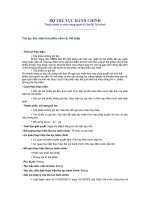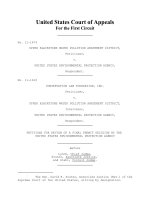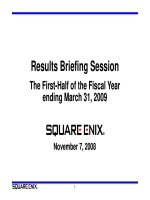History+the first ppt
Bạn đang xem bản rút gọn của tài liệu. Xem và tải ngay bản đầy đủ của tài liệu tại đây (76.39 KB, 2 trang )
History
Prayers of thanks and special thanksgiving ceremonies are common among almost all
religions after harvests and at other times.
[1]
The holiday's history in North America is
rooted in English traditions dating from the Protestant Reformation. It also has aspects
of a harvest festival, even though the harvest in New England occurs well before the
late-November date of the holiday
[2][1]
In the English tradition, days of thanksgiving and special thanksgiving religious
services became important during the English Reformation in the reign of Henry
VIII and in reaction to the large number of religious holidays on the Catholic calendar.
Before 1536 there were 95 Church holidays, plus 52 Sundays, when people were
required to attend church and forego work and sometimes pay for expensive
celebrations. The 1536 reforms reduced the number of Church holidays to 27, but
somePuritans, the radical reformers of their age, wished to completely eliminate all
Church holidays, including Christmas andEaster. The holidays were to be replaced by
specially called Days of Fasting or Days of Thanksgiving, in response to events that
the Puritans viewed as acts of special providence. Unexpected disasters or threats of
judgement from on high called for Days of Fasting. Special blessings, viewed as
coming from God, called for Days of Thanksgiving. For example, Days of Fasting
were called on account of drought in 1611, floods in 1613, and plague in 1604 and
1622. Days of Thanksgiving were called following the victory over the Spanish
Armada in 1588, and following the deliverance of Queen Anne in 1705. An unusual
annual Day of Thanksgiving began in 1606 following the failure of the Gunpowder
Plot in 1605, and developed intoGuy Fawkes Day.
[3]
The First Thanksgiving at Plymouth By Jennie A. Brownscombe (1914)
In the United States, the modern Thanksgiving holiday tradition is commonly traced
to a 1621 celebration at Plymouth in present-day Massachusetts. The 1621 Plymouth
feast and thanksgiving was prompted by a good harvest. In later years, the tradition
was continued by civil leaders such as Governor Bradford who planned a
thanksgiving celebration and fast in 1623.
[9][10][11]
While initially, the Plymouth colony
did not have enough food to feed half of the 102 colonists, theWampanoag Native
Americans helped the Pilgrims by providing seeds and teaching them to fish. The
practice of holding an annual harvest festival like this did not become a regular affair
in New England until the late 1660s.
[12]
Pilgrims and Puritans who began emigrating from England in the 1620s and 1630s
carried the tradition of Days of Fasting and Days of Thanksgiving with them to New
England. Several days of Thanksgiving were held in early New England history that
have been identified as the "First Thanksgiving", including Pilgrim holidays
in Plymouth in 1621 and 1623, and a Puritan holiday in Boston in 1631.
[13][14]
Thanksgiving proclamations were made mostly by church leaders in New England up
until 1682, and then by both state and church leaders until after the American
Revolution. During the revolutionary period, political influences affected the issuance
of Thanksgiving proclamations. Various proclamations were made by royal
governors, John Hancock, GeneralGeorge Washington, and the Continental Congress,
each giving thanks to God for events favorable to their causes.
[15]
As President of the
United States, George Washington proclaimed the first nation-wide thanksgiving
celebration in America marking November 26, 1789, "as a day of public thanksgiving
and prayer to be observed by acknowledging with grateful hearts the many and signal
favours of Almighty God".
[16]
According to historian Jeremy Bangs, director of the Leiden American Pilgrim
Museum, the Pilgrims may have been influenced by watching the annual services of
Thanksgiving for the relief of the siege of Leiden in 1574, while they were staying in
Leiden.
[17]









